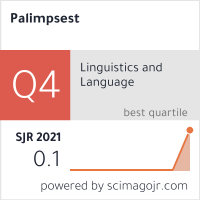CELL-PHONE NOVELS: A LINGUISTIC AND LITERARY (AND SOCIO-CULTURAL) POINT OF VIEW BEHIND THE PHENOMENON OF MOBILE NOVELS IN ITALY
DOI:
https://doi.org/10.46763/PALIM21116135tAbstract
The following paper will be examining the socio-literary phenomenon of cell-phone novels born in Japan (originally known as keitai shousetsu) in the early years of the 2000s and subsequently spread to the Western countries, including America and Europe. In the subsequent paragraphs, there lies a description regarding the nature, the genesis and the structure of these works on mobile phones, including some examples of these successful novels which will be listed and presented (from the native land and the American and the European areas as well, especially from the German-speaking ones) and have been able to shake the publishing market, as well as illustrating the phenomenon from a linguistic and literary point of view, which reveals similarities with the language of SMS and chats. One of the key-objectives is to clarify the reasons why cell-phone novels have not discovered fertile ground in Italy: although some socio-cultural reasons behind their lack of success in this country are suggested, there are still alternative literary genres collimating with new technologies to be found, such as "hybrid novels" from the "digital" or "electronic literature". The signals of the changing literature are present: in the future, there lies the hope to continue observing the evolution of writing and reading, as well as their role in the digital age alongside the technological development.
Keywords: cell-phone novels, Japan, digital literature, linguistics, Italy.


